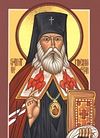

| Previous day | Next day |
| Old Style
February 3
|
Thursday |
New Style
February 16
|
| Tone 1. | No fast.
|
![]() Afterfeast of the Meeting of Our Lord.
Afterfeast of the Meeting of Our Lord. ![]() Holy and Righteous Symeon the God-receiver and Anna the Prophetess (1st c.).
Holy and Righteous Symeon the God-receiver and Anna the Prophetess (1st c.). ![]() St. Nicholas, Equal-to-the-Apostles, enlightener of Japan (1912).
St. Nicholas, Equal-to-the-Apostles, enlightener of Japan (1912).
Prophet Azariah (10th c. в до Р.10th c..). Martyrs Papias, Diodorus, and Claudianus, at Perge in Pamphylia (250). Martyr Blaise of Caesarea in Cappadocia (3rd c.). Martyrs Adrian and Eubulus, at Caesarea in Cappadocia (ca. 308-309). St. Romanus, prince of Uglich (1285). St. Symeon, bishop of Polotsk and Tver (1289). St. Svyatoslav-Gabriel and his son St. Dimitry, of Yuriev (1253).
New Hieromartyr Vladimir (Zagreba), hieromonk of Borisoglebsk Monastery (Novotorzhok) (1938).
Martyr Paul the Syrian (284-305). St. Lawrence, archbishop of Canterbury (619). St. Werburga of Chester, abbess (ca. 700). St. Ansgar, bishop of Hamburg, enlightener of Denmark and Sweden (865). St. James, archbishop of Serbia (1292). St. Sabbas of Ioannina (15th c.). St. Ignatius of Mariupol in Crimea, metropolitan of Gothia and Kafa (1786). New Martyrs Stamatius and John, brothers, and Nicholas, their companion, at Spetses on Chios (1822).
Repose of Schemamonk Paul of Simonov Monastery (1825), disciple of St. Paisius (Velichkovsky), and Hieromonk Isidore of Gethsemane Skete, Moscow (1908).
Thoughts for Each Day of the Year
According to the Daily Church Readings from the Word of God
By St. Theophan the Recluse

Thursday. [I John 4:20–5:21; Mark 15:1–15]
This is the victory that overcometh the world, even our faith (I John 5:4)—the Christian faith. To overcome the world—what does that mean? Not to exterminate all those who love the world, or to annihilate and destroy all which is loved by the world. It means rather that while living amidst those who love the world and moving amidst customs loved of the world, we live and be alien to everyone and everything. As soon as you have rejected the world and everything worldly, you have by this very action overcome the world. But who teaches you to reject the world and who gives you strength for this? Our [Orthodox] Faith gives the strength. It discloses the destructiveness of the delusions of the world and inspires the desire to free oneself of their nets. Then, when one resolves to break these bonds, repents and approaches the Mysteries of renewal—baptism or repentance—faith allows him to mystically feel the sweetness of a life opposed to the world, a sweetness with which all the pleasures of the world cannot in any way enter into comparison. As a result, a loathing for everything worldly dwells in the heart, which actually is overcoming the world. But in this mystical action, as a result of which loathing for the world is born, the power to steadfastly abide in this loathing and alienation from the world also is granted; and this is a victory decisive and lasting.
Articles
 Martyr Blaise of Caesarea, in CappadociaSaint Blaise of Caesarea lived in the third century. He was from Caesarea in Cappadocia (Asia Minor) and was a shepherd. |





